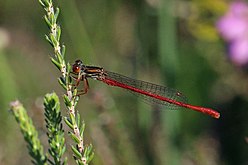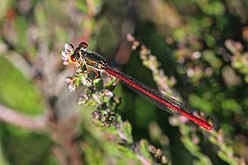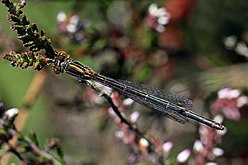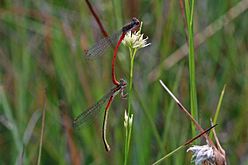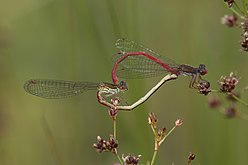Small red damselfly
This article includes a list of references, related reading, or external links, but its sources remain unclear because it lacks inline citations. (March 2024) |
| Small red damselfly | |
|---|---|
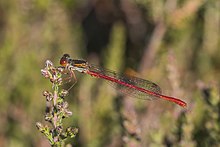
| |
| Male | |
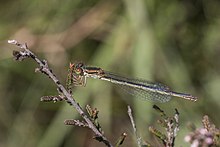
| |
| Female, form melanogastrum both at Crockford Stream, New Forest Hampshire, UK | |
| Scientific classification | |
| Domain: | Eukaryota |
| Kingdom: | Animalia |
| Phylum: | Arthropoda |
| Class: | Insecta |
| Order: | Odonata |
| Suborder: | Zygoptera |
| Family: | Coenagrionidae |
| Genus: | Ceriagrion |
| Species: | C. tenellum
|
| Binomial name | |
| Ceriagrion tenellum (De Villers, 1789)
| |
The small red damselfly (Ceriagrion tenellum) is a small damselfly flying in heathland bogs and streams. It is in the family Coenagrionidae.
Identification
[edit]Ceriagrion tenellum is only 25–35 millimetres (0.98–1.38 in) long. It is a lot shorter than the large red damselfly, with which it is sometimes confused. In both sexes the thorax is bronze-black on top.
The male has an entirely red abdomen.
The female has a bronze-black abdomen with only the front and back of it red. The dark form melanogastrum has an almost entirely dark abdomen marked with pale segment divisors, the last two of which are reddish. A very rare form, erythrogastrum, resembles the male.
-
immature male
-
male
dorsal view -
female
form melanogastrum
dorsal view -
in tandem
female form typica -
mating
female form typica
Behaviour
[edit]Adults fly low and weakly, rarely going far from breeding waters. Like the southern damselfly, which this species sometimes accompanies, they rarely fly in any but the warmest and calmest weather conditions. They can, however, be surprisingly inconspicuous, even the males.
The males are aggressive towards each other but are not territorial. Oviposition takes place in tandem.
Eggs and larvae
[edit]It lays elongated eggs in submerged and emergent plants which subsequently hatch after about a month. The larvae are very small, about 16–17 millimetres (0.63–0.67 in), and are found in acidic bogs, streams and ponds. They live among debris in bogs and develop after two years.
References
[edit]- ^ Samraoui, B.; Ferreira, S. (2018). "Ceriagrion tenellum". IUCN Red List of Threatened Species. 2018: e.T165495A75418578. doi:10.2305/IUCN.UK.2018-1.RLTS.T165495A75418578.en. Retrieved 18 November 2021.
- Dijkstra, Klaas-Douwe B. (2006). Field Guide to the Dragonflies of Britain and Europe. British Wildlife. pp. 66–67. ISBN 0-9531399-4-8.
- "Small Red Damselfly". British Dragonfly Society. Retrieved 11 August 2010.
External links
[edit] Media related to Ceriagrion tenellum at Wikimedia Commons
Media related to Ceriagrion tenellum at Wikimedia Commons


